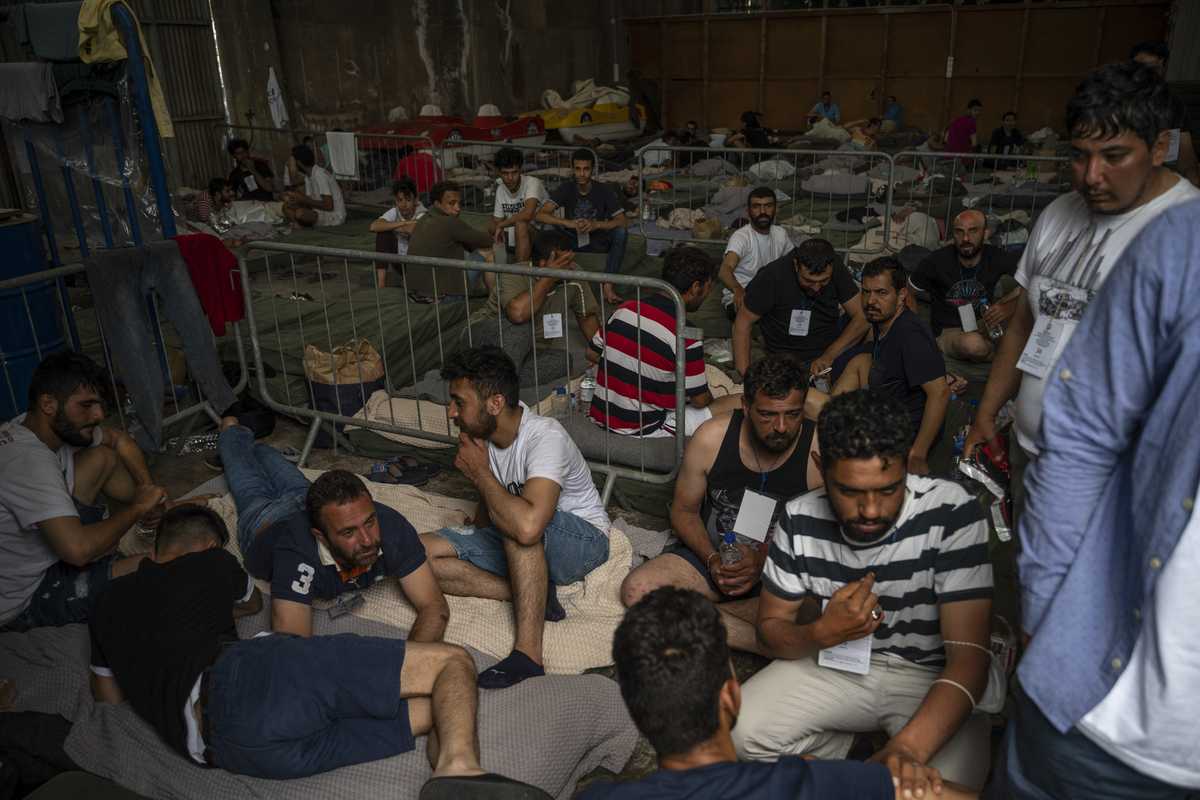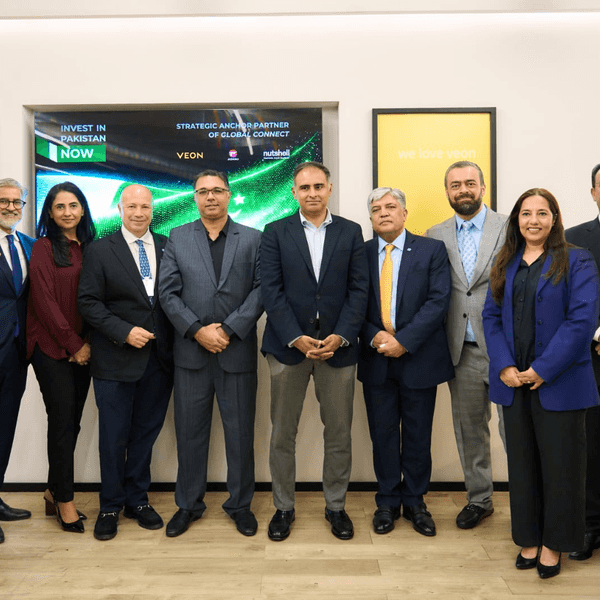Pakistan's human rights body flags surge in illegal migration, calls for urgent reforms
NCHR links illegal migration to poverty, smuggling networks, and EU border tightening

Javed Hussain
Correspondent
I have almost 20 years of experience in print, radio, and TV media. I started my career with "Daily Jang" after which I got the opportunity to work in FM 103, Radio Pakistan, News One, Ab Tak News, Dawn News TV, Dunya News, 92 News and regional channels Rohi TV, Apna Channel and Sach TV where I worked and gained experience in different areas of all three mediums. My journey from reporting to news anchor in these organisations was excellent. Now, I am working as a correspondent with Nukta in Islamabad, where I get the opportunity of in-depth journalism and storytelling while I am now covering parliamentary affairs, politics, and technology.

Survivors of a shipwreck sit inside a warehouse at the port in Kalamata town, on June 15, 2023, after a boat carrying migrants sank in international waters in the Ionian Sea.
AFP
Pakistan’s National Commission for Human Rights (NCHR) has raised serious concerns over the country’s growing irregular migration crisis and associated human rights violations in its 2024 annual report presented to the National Assembly.
The report offers a sweeping review of fundamental human rights conditions in the country and includes a dedicated section on illegal migration from Pakistan to foreign countries, with a focus on Europe.
The NCHR, an independent statutory body tasked with monitoring and promoting human rights, conducted a comprehensive analysis that distinguishes between human trafficking and migrant smuggling. While both are categorized under irregular migration, the report notes their legal and enforcement implications differ significantly.
Migration vs smuggling
The report makes a clear distinction between human trafficking and migrant smuggling, which are often conflated in public discourse. Human trafficking typically involves coercion, deception, or force for exploitation, while migrant smuggling refers to the voluntary, though illegal, facilitation of cross-border movement for financial gain.
Irregular migration includes overstaying visas, traveling without valid documents, or entering a country unlawfully. The report warns that many individuals caught in such situations end up stateless, detained, or exposed to exploitation by employers, traffickers, or even border authorities.
The NCHR identifies several structural drivers behind the trend. Poverty, rising unemployment, declining public services, and political instability, compounded by climate disasters like the 2022 floods, have all fueled an uptick in migration, especially from rural areas.
With few legal pathways available for low-skilled labor migration to Europe, many desperate youth turn to smugglers. Regions such as Gujranwala, Gujrat, and Mandi Bahauddin in Punjab have emerged as hotbeds of irregular migration, owing to a decades-old culture of overseas labor. Family networks, community pressure, and visible remittances often reinforce the cycle.
The report underscores that Pakistan ranked as the fifth most common country of origin for irregular migrants arriving in Europe by mid-2023. Italy, in particular, has seen a sharp rise in Pakistani arrivals via the Central Mediterranean Route.
From Karachi to Calabria
According to the report, smuggling networks have become increasingly tech-savvy. Agents now use platforms like YouTube, TikTok, and WhatsApp to advertise "packages" to Europe, sometimes offering step-by-step guides. Many of these videos show edited clips of border crossings, fences being scaled, or passengers disembarking in Europe, often without mention of the fatal risks involved.
The report refers to these as “digital illusions” that manipulate vulnerable viewers into believing they, too, can make the journey. Often, the smugglers have links across countries, collaborating with counterparts in Iran, Turkey, Libya, Egypt, and the UAE, where many migrants begin their journey before attempting the sea crossing.
Tragedy in Greece
The issue gained global attention in June 2023, when an overcrowded fishing trawler capsized off the coast of Greece, killing hundreds of migrants, many of them Pakistanis from Punjab. The boat, believed to have carried up to 750 people, sank despite multiple distress signals. Survivors later testified that Pakistani smugglers had facilitated the entire journey and that the crew had ignored urgent pleas for help.
The NCHR says the tragedy symbolized a broader failure in migration governance. It accused European governments of “fortress mentality” and criticized their reduction of search-and-rescue missions, calling such policies “de facto death sentences” for migrants.
The report also warns that unless there are legal alternatives and better enforcement against smuggling networks, similar tragedies will occur again.
FIA’s crackdown
In response to increasing international scrutiny, Pakistan’s Federal Investigation Agency (FIA) has intensified its crackdown on human smugglers. According to FIA data cited in the report, 193 cases of smuggling were registered in 2023, in which 854 individuals were arrested. By mid-2023, 378 illegal agents were identified and apprehended by authorities.
The report further states that 46,193 deportations by air were recorded in 2022, with another 25,423 through August 2023. Deportations by land totaled 5,676 in 2022 and 3,150 through August 2023. Additionally, 19,055 passengers were offloaded at airports in 2022 over suspicion of traveling illegally, with 10,366 more flagged in 2023.
The FIA has also expanded its international cooperation by establishing liaison offices in Greece, Turkey, Oman, Dubai, Malaysia, and the UK. A specialized National Trafficking in Persons (TIP) Unit has been created to centralize enforcement and intelligence.
The report credits Pakistan’s accession to the UN TIP Protocol in November 2022 and the launch of its National Action Plan (2021–2025) for creating a policy foundation, though it notes implementation remains uneven.
Diplomatic fallout
In a confidential letter cited in the report, Pakistan’s ambassador to Greece warned the Foreign Office that the unchecked smuggling crisis was damaging Pakistan’s global image and jeopardizing trade privileges under the EU’s Generalized Scheme of Preferences (GSP+).
“The situation is fast becoming unmanageable,” the diplomat wrote. “We must close the tap from our end.”
The NCHR agrees, stating that migration governance must become a core foreign policy priority, not just a domestic enforcement issue.
The report concludes by urging the Pakistani government to adopt a holistic response. While stricter law enforcement is necessary, it argues that long-term solutions must address structural inequality, lack of legal migration routes, rural underdevelopment, and climate vulnerability.
The report recommends launching targeted public awareness campaigns to dispel smuggler propaganda and misinformation that lure vulnerable individuals into taking dangerous migration routes. It calls for prioritizing investments in job creation, particularly for youth, to address economic drivers of irregular migration.
Additionally, the commission urges the expansion of vocational training and skill certification programs to improve employability. It also advocates for negotiating more bilateral labor agreements with countries such as Italy, Germany, and Qatar, and for integrating returnee migrants into local economies to break the cycle of re-migration.







Comments
See what people are discussing